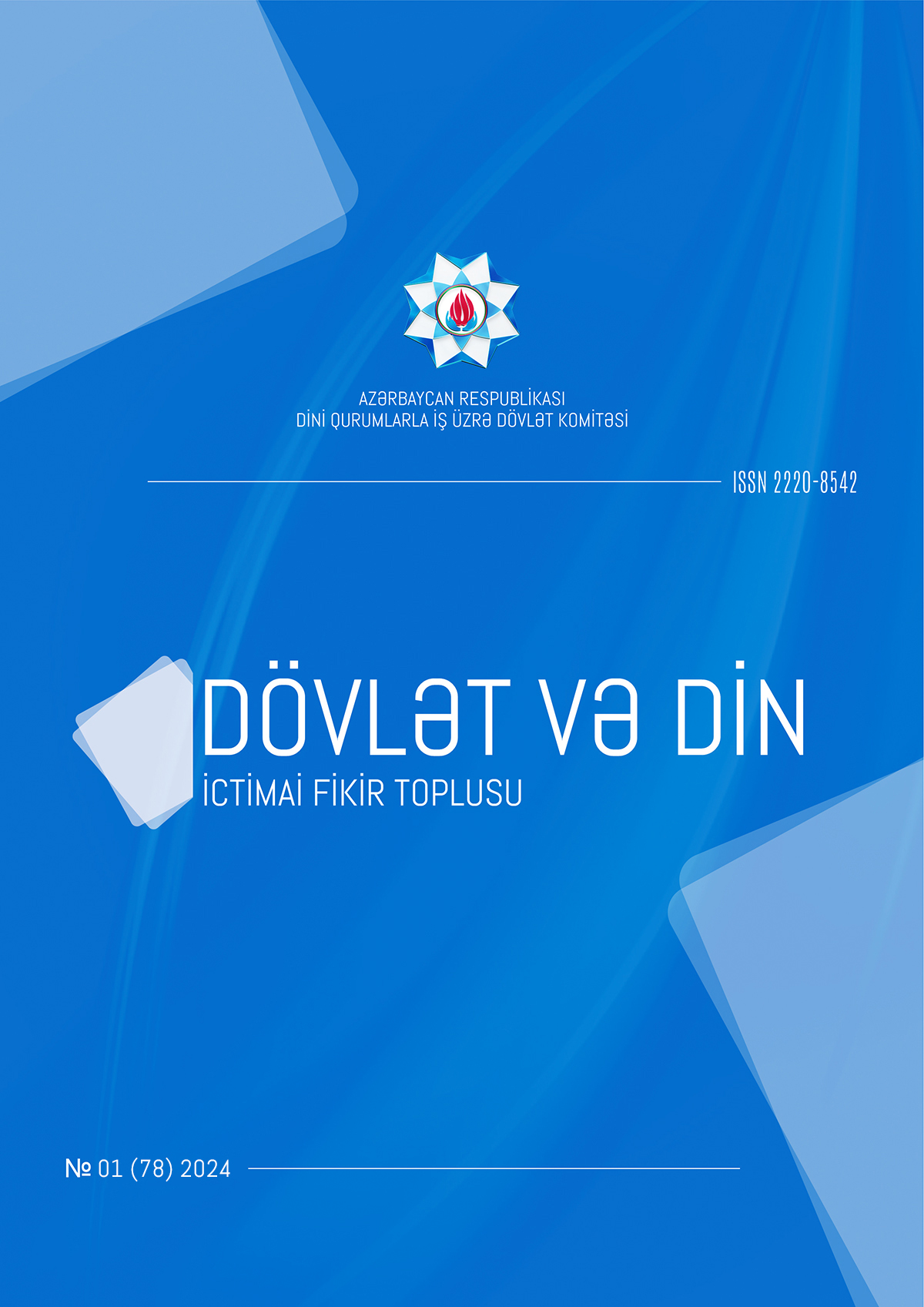XIX ƏSRDƏ UDİLƏRİN ETNOKONFESSİONAL VƏZİYYƏTİ
Məhəbbət Paşayeva | pashayeva.m@gmail.com
zərbaycan Dövlət İqtisad Universiteti Humanitar fənlər kafedrasının professoru, Multikulturalizm Tədqiqat Mərkəzinin rəhbəri tarix elmləri doktoruTarixə pəncərə
ƏDƏBİYYAT
- Каганкатваци М. История агван Мойсея Каганкатваци, писателя X века / Пер. с армян. К.Патканова. СПб.: типография Императорской Академии наук, 1861.
- Ворошил Г. Удино-азербайджано-русский словарь. Баку: 1974.
- Дьяконов И.М. История Мидии от древнейших времен до конца IV в. до н.э. М. – Л.: 1956 .
- Алиев И. История Мидии. Баку: Изд-во Азерб/ ССР, 1960.
- Алиев K. Античная Кавказская Албания. Баку: 1992.
- Иеромонах Алексий (Никоноров). История христианства в Кавказской Албании. Баку: 2005.
- Mamedova Ф. Кавказская Албания и албаны. Баку: 2005.
- Величко В.Л. Кавказ. Русское дело и междуплеменные вопросы. Баку: 1990.
- Архив внешней политики России, фонд “Сношения России с Арменией”, 1724, дело № 4, л.27.
- Полное Собрание Законов Российской империи. Собрание второе. Т. XI. Отделение первое. 1836. От № 8739–9493. С-Петербург: 1837.
- Документ 1908 г., ЦГИА, фонд 821, оп.150, д.477.
- Aleksandr Düma. Qafqaz. Bakı: “Qafqaz”, 2010.
- Бархударянц М. Арцах. 1895.
- Эритсова А.Д. Экономический быт государственных крестян Казахского уезда, Элизаветполской губернии. Материалы, т. 2. Тифлис: 1886.
- Кавказский календар на 1895 г, отд.5. Тифлис: 1894.
- Кавказский календар на 1915 г. Тифлис: 1914.
- Кавказский календарь на 1910 г., часть I. Тифлис: 1910.
- Cavadov Q. Azərbaycanın azsaylı xalqları və milli azlıqları. Bakı: Elm, 2000.
- Ворошил Г. К трехъязычию удин. Проблемы двуязычия и многоязычия. М.: 1972.
- Брук С.И. Ареальные исследования в языкознании и этнографии. Институт этнографии имени Н.Н.Миклухо-Маклая Академии наук СССР. Л.: 1978.
- Материалы для изучения экономического быта государственных крестьян Закавказского края. том 2, вып. 3. Тифлис: 1886.
- Арасханианц А. Экономический быт государственных крестян Нухинского уезда. Материалы, т.7. Тифлис: 1887.
- Арутинов А.А. Удины. Материалы для антропологии Кавказа. Москва: 1905.
- Камералное описание жителей города Нухи и Шекинской провинции за 1824 г.
- https://report.az/qarabag/prezident-xudaveng-kilsesi-oz-sahiblerine-bizim-udi-qardaslarimiza-qaytarilib/
- Кавказский календар на 1910 г. Тифлис: 1909.
- Göyüşov R. Amaras-Ağoğlan. Bakı: 1975.
- Cвод статистических данных о населении Закавказского края (Елизаветпольская губерния), посемейныe спискi 1886г. Тифлис: 1893.
ETHNO-CONFESSIONAL SITUATION OF THE UDINS IN THE XIX CENTURY
Mahabbat Pashayeva | pashayeva.m@gmail.com
zərbaycan Dövlət İqtisad Universiteti Humanitar fənlər kafedrasının professoru, Multikulturalizm Tədqiqat Mərkəzinin rəhbəri tarix elmləri doktoruWindow into History
SUMMARY
The Udins are one of the 26 tribes represented in the Albanian Tribal Union that existed in ancient Azerbaijan, Caucasian Albania. During the period of Caucasian Albania (IV-VIII BC) in Azerbaijan, many Albanian tribes, such as Gargar, Hun, Uti, Kaspi, Gel, Er, Kat, united into the Albanian tribal union. The Udins, one of the ancient and Albanian origin tribes of the Caucasus, the last descendants of the Christian Albanians, lived on their historical lands until the 19th century. They were able to preserve Albanian Christian traditions, language, ethnic identity, material and spiritual culture, as well as the Albanian Apostolic Autocephalous Church. The article analyzes the history of the Udins, the area of distribution of one of the ancient ethnic groups of Azerbaijan and the ethno-confessional situation as a result of the national colonial policy pursued by the Russian Empire in the Caucasus in the 19th century, the process of destruction of the ethnic identity of the Udi people after the abolition of the Albanian Church in 1836
REFERENCE LIST
- Каганкатваци М. История агван Мойсея Каганкатваци, писателя X века / Пер. с армян. К.Патканова. СПб.: типография Императорской Академии наук, 1861.
- Ворошил Г. Удино-азербайджано-русский словарь. Баку: 1974.
- Дьяконов И.М. История Мидии от древнейших времен до конца IV в. до н.э. М. – Л.: 1956 .
- Алиев И. История Мидии. Баку: Изд-во Азерб/ ССР, 1960.
- Алиев K. Античная Кавказская Албания. Баку: 1992.
- Иеромонах Алексий (Никоноров). История христианства в Кавказской Албании. Баку: 2005.
- Mamedova Ф. Кавказская Албания и албаны. Баку: 2005.
- Величко В.Л. Кавказ. Русское дело и междуплеменные вопросы. Баку: 1990.
- Архив внешней политики России, фонд “Сношения России с Арменией”, 1724, дело № 4, л.27.
- Полное Собрание Законов Российской империи. Собрание второе. Т. XI. Отделение первое. 1836. От № 8739–9493. С-Петербург: 1837.
- Документ 1908 г., ЦГИА, фонд 821, оп.150, д.477.
- Aleksandr Düma. Qafqaz. Bakı: “Qafqaz”, 2010.
- Бархударянц М. Арцах. 1895.
- Эритсова А.Д. Экономический быт государственных крестян Казахского уезда, Элизаветполской губернии. Материалы, т. 2. Тифлис: 1886.
- Кавказский календар на 1895 г, отд.5. Тифлис: 1894.
- Кавказский календар на 1915 г. Тифлис: 1914.
- Кавказский календарь на 1910 г., часть I. Тифлис: 1910.
- Cavadov Q. Azərbaycanın azsaylı xalqları və milli azlıqları. Bakı: Elm, 2000.
- Ворошил Г. К трехъязычию удин. Проблемы двуязычия и многоязычия. М.: 1972.
- Брук С.И. Ареальные исследования в языкознании и этнографии. Институт этнографии имени Н.Н.Миклухо-Маклая Академии наук СССР. Л.: 1978.
- Материалы для изучения экономического быта государственных крестьян Закавказского края. том 2, вып. 3. Тифлис: 1886.
- Арасханианц А. Экономический быт государственных крестян Нухинского уезда. Материалы, т.7. Тифлис: 1887.
- Арутинов А.А. Удины. Материалы для антропологии Кавказа. Москва: 1905.
- Камералное описание жителей города Нухи и Шекинской провинции за 1824 г.
- https://report.az/qarabag/prezident-xudaveng-kilsesi-oz-sahiblerine-bizim-udi-qardaslarimiza-qaytarilib/
- Кавказский календар на 1910 г. Тифлис: 1909.
- Göyüşov R. Amaras-Ağoğlan. Bakı: 1975.
- Cвод статистических данных о населении Закавказского края (Елизаветпольская губерния), посемейныe спискi 1886г. Тифлис: 1893.
ЭТНОКОНФЕССИОНАЛЬНОЕ ПОЛОЖЕНИЕ УДИНОВ В XIX ВЕКЕ
Махаббат Пашаева | pashayeva.m@gmail.com
zərbaycan Dövlət İqtisad Universiteti Humanitar fənlər kafedrasının professoru, Multikulturalizm Tədqiqat Mərkəzinin rəhbəri tarix elmləri doktoruОкно в историю
РЕЗЮМЕ
Удины - одно из 26 племен, представленных в Албанском Племенном Союзе, существовавшем в древнем Азербайджане, Кавказской Албании. В период Кавказской Албании (IV-VIII до н.э.) в Азербайджане многие албанские племена, такие как гаргар, гун, ути, каспи, гель, ер, кат, объединились в Албанский племенной союз. Удины, одни из древних и албанского происхождения племен Кавказа, последние потомки албанцевхристиан, жили на своих исторических землях до XIX века. Они смогли сохранить албанские христианские традиции, язык, этническую идентичность, материальную и духовную культуру, а также Албанскую Апостольскую автокефальную церковь. В статье анализируется история удинов, ареал распространения одного из древних этносов Азербайджана и этноконфессиональная ситуация как результат национальной колониальной политики, проводимой Российской империей на Кавказе в XIX веке, процесс разрушения этнической идентичности удинев после упразднения Албанской церкви в 1836 году
ЛИТЕРАТУРА
- Каганкатваци М. История агван Мойсея Каганкатваци, писателя X века / Пер. с армян. К.Патканова. СПб.: типография Императорской Академии наук, 1861.
- Ворошил Г. Удино-азербайджано-русский словарь. Баку: 1974.
- Дьяконов И.М. История Мидии от древнейших времен до конца IV в. до н.э. М. – Л.: 1956 .
- Алиев И. История Мидии. Баку: Изд-во Азерб/ ССР, 1960.
- Алиев K. Античная Кавказская Албания. Баку: 1992.
- Иеромонах Алексий (Никоноров). История христианства в Кавказской Албании. Баку: 2005.
- Mamedova Ф. Кавказская Албания и албаны. Баку: 2005.
- Величко В.Л. Кавказ. Русское дело и междуплеменные вопросы. Баку: 1990.
- Архив внешней политики России, фонд “Сношения России с Арменией”, 1724, дело № 4, л.27.
- Полное Собрание Законов Российской империи. Собрание второе. Т. XI. Отделение первое. 1836. От № 8739–9493. С-Петербург: 1837.
- Документ 1908 г., ЦГИА, фонд 821, оп.150, д.477.
- Aleksandr Düma. Qafqaz. Bakı: “Qafqaz”, 2010.
- Бархударянц М. Арцах. 1895.
- Эритсова А.Д. Экономический быт государственных крестян Казахского уезда, Элизаветполской губернии. Материалы, т. 2. Тифлис: 1886.
- Кавказский календар на 1895 г, отд.5. Тифлис: 1894.
- Кавказский календар на 1915 г. Тифлис: 1914.
- Кавказский календарь на 1910 г., часть I. Тифлис: 1910.
- Cavadov Q. Azərbaycanın azsaylı xalqları və milli azlıqları. Bakı: Elm, 2000.
- Ворошил Г. К трехъязычию удин. Проблемы двуязычия и многоязычия. М.: 1972.
- Брук С.И. Ареальные исследования в языкознании и этнографии. Институт этнографии имени Н.Н.Миклухо-Маклая Академии наук СССР. Л.: 1978.
- Материалы для изучения экономического быта государственных крестьян Закавказского края. том 2, вып. 3. Тифлис: 1886.
- Арасханианц А. Экономический быт государственных крестян Нухинского уезда. Материалы, т.7. Тифлис: 1887.
- Арутинов А.А. Удины. Материалы для антропологии Кавказа. Москва: 1905.
- Камералное описание жителей города Нухи и Шекинской провинции за 1824 г.
- https://report.az/qarabag/prezident-xudaveng-kilsesi-oz-sahiblerine-bizim-udi-qardaslarimiza-qaytarilib/
- Кавказский календар на 1910 г. Тифлис: 1909.
- Göyüşov R. Amaras-Ağoğlan. Bakı: 1975.
- Cвод статистических данных о населении Закавказского края (Елизаветпольская губерния), посемейныe спискi 1886г. Тифлис: 1893.




